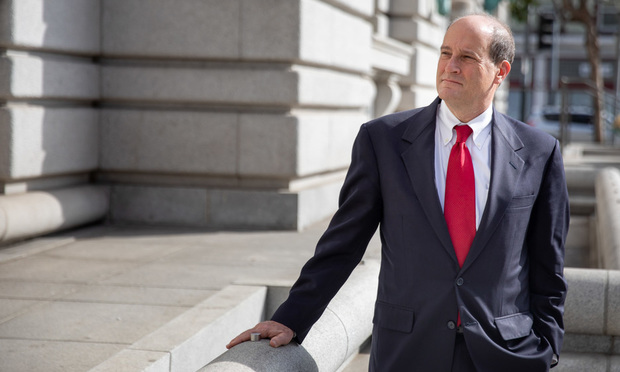'Cannot Have It Both Ways': Doug Letter Criticizes Trump Lawyers for Contradictions on Impeachment
"President Trump's arguments in the impeachment trial contradict DOJ's assertion ... that the committee may not seek to enforce its subpoenas in court," Letter wrote in a filing Thursday evening.
January 23, 2020 at 11:28 PM
5 minute read
 Douglas Letter, general counsel to the U.S. House of Representatives. (Photo: Jason Doiy/ALM)
Douglas Letter, general counsel to the U.S. House of Representatives. (Photo: Jason Doiy/ALM)
House general counsel Douglas Letter called out lawyers representing President Donald Trump in the impeachment trial and in the Congress' various lawsuits against the administration for presenting contradictory arguments on whether lawmakers can sue the executive branch in federal court.
Letter submitted a pair of letters late Thursday to two panels on the U.S. Court of Appeals for the D.C. Circuit, each weighing an impeachment-related lawsuit filed by the House, highlighting the conflicting claims being made by different Trump lawyers.
In a letter to the judges weighing the bid to compel testimony from former White House counsel Donald McGahn, Letter wrote that "President Trump's arguments in the impeachment trial contradict DOJ's assertion in this case that the committee may not seek to enforce its subpoenas in court."
He noted that, in their answer to the articles of impeachment against Trump, the president's lawyers criticized the House for not going to court to obtain more evidence in the inquiry. Letter also quoted Trump's personal attorney Jay Sekulow's arguments during the Senate trial, in which Sekulow said: "So take Article III of the United States Constitution and remove it? We're acting as if the courts are an improper venue to determine constitutional issues of this magnitude? That is why we have courts. That is why we have a federal judiciary."
"In light of President Trump's argument, it is not clear whether DOJ still maintains its position that courts are barred from considering subpoena-enforcement suits brought by the House," Letter wrote. "At the very least, President Trump's recognition that courts should resolve such suits undermines DOJ's contrary threshold arguments in this case, which seek to prevent the House and its committees from seeking judicial resolution of subpoena-enforcement disputes. The executive branch cannot have it both ways."
Republicans had argued throughout the House's impeachment inquiry that Democrats must go to court to obtain more evidence before drafting articles of impeachment against Trump—a claim that Trump's impeachment lawyers, led by Sekulow and White House counsel Pat Cipollone, have now picked up.
That clashes with the claims Justice Department attorneys have been making for months in fighting the House's lawsuits.
DOJ lawyer James Burnham told U.S. District Judge Trevor McFadden in May of last year during arguments over Democrats' challenge to Trump's diversion of military funds for a border wall that the department believed the House could never go to court against the administration. McFadden agreed that the House didn't have standing and ruled for DOJ.
Burnham made the same arguments to U.S. District Judge Ketanji Brown Jackson over the McGahn testimony. She rejected those claims in her opinion ruling for the House.
Justice Department lawyer Hashim Mooppan made that same claim to the D.C. Circuit earlier this month over the McGahn testimony, warning the panel of judges that intervening in a dispute between the two other branches—particularly during an impeachment—could undermine public trust in the courts.
In a separate letter Thursday to a three-judge panel considering a bid for grand jury materials redacted from former special counsel Robert Mueller's report, Letter again noted the change in opinion from lawyers representing the president on the House's standing in court.
He also cited elements of the ongoing Senate trial, like the use of trial memoranda, pretrial motions and having materials "admitted into evidence" to argue that impeachment does constitute a judicial proceeding, one of the few times grand jury materials can be released. DOJ lawyers have said that impeachment is not a judicial proceeding.
In each letter, the House's top lawyer urged the court to rule quickly.
"The start of the impeachment trial underscores the Committee's urgent need for the withheld material," Letter wrote to the judges in the Mueller grand jury case. "The particularized-need standard turns on the 'public interest,' and it is difficult to conceive of a public interest more substantial than ensuring that the House obtains highly pertinent evidence to present to the Senate as it considers whether the president should be removed from office."
On Friday, a senior DOJ official pushed back on Letter's claims, calling it an "entirely contrived conflict." The official argued that the House, not the president, "cannot have it both ways."
"It cannot claim in court that courts should resolve every privilege dispute between the House and the president, while claiming in the Senate that impeachment should be the first remedy in every privilege dispute rather than the last resort," the senior DOJ official said. "If the House thinks it has the right to challenge privilege assertions in court, it cannot refuse to use that tool and instead leap immediately to the most extreme measure the Constitution provides."
Mooppan doubled down on DOJ's stance in a letter submitted to the McGahn court on Friday.
"The impeachment trial statements excerpted by the Committee were simply expounding on the President's position that the House cannot have it both ways; they plainly were not reversing the position that the House may not properly seek judicial enforcement of subpoenas against the Executive," the letter reads.
Read more:
'Go Find a Lawyer, Somewhere': Schiff Slams Trump Impeachment Claims Rejected by Allies
No Federalist Society or American Constitution Society Judges? Judiciary Considers Membership Ban
Roberts Admonishes Impeachment Lawyers to 'Remember Where They Are'
This content has been archived. It is available through our partners, LexisNexis® and Bloomberg Law.
To view this content, please continue to their sites.
Not a Lexis Subscriber?
Subscribe Now
Not a Bloomberg Law Subscriber?
Subscribe Now
NOT FOR REPRINT
© 2025 ALM Global, LLC, All Rights Reserved. Request academic re-use from www.copyright.com. All other uses, submit a request to [email protected]. For more information visit Asset & Logo Licensing.
You Might Like
View All
GOP Now Holds FTC Gavel, but Dems Signal They'll Be a Rowdy Minority
6 minute read
Fired by Trump, EEOC's First Blind GC Lands at Nonprofit Targeting Abuses of Power
3 minute read
Latham Adds Former Treasury Department Lawyer for Cross-Border Deal Guidance
2 minute read
'Erroneous Rulings'?: Wilmer Asks 4th Circuit to Overturn Mosby's Criminal Convictions
3 minute readTrending Stories
- 1Legal Restrictions Governing Artificial Intelligence in the Workplace
- 2Failure to Adequately Inform Patients
- 3'FTX' One Year Later: The Impact on Examiner Practice in Bankruptcy Courts
- 4Gen AI Legal Contract Startup Ivo Announces $16 Million Series A Funding Round
- 5DOJ's Flawed Thinking in Challenging HPE-Juniper Merger
Who Got The Work
J. Brugh Lower of Gibbons has entered an appearance for industrial equipment supplier Devco Corporation in a pending trademark infringement lawsuit. The suit, accusing the defendant of selling knock-off Graco products, was filed Dec. 18 in New Jersey District Court by Rivkin Radler on behalf of Graco Inc. and Graco Minnesota. The case, assigned to U.S. District Judge Zahid N. Quraishi, is 3:24-cv-11294, Graco Inc. et al v. Devco Corporation.
Who Got The Work
Rebecca Maller-Stein and Kent A. Yalowitz of Arnold & Porter Kaye Scholer have entered their appearances for Hanaco Venture Capital and its executives, Lior Prosor and David Frankel, in a pending securities lawsuit. The action, filed on Dec. 24 in New York Southern District Court by Zell, Aron & Co. on behalf of Goldeneye Advisors, accuses the defendants of negligently and fraudulently managing the plaintiff's $1 million investment. The case, assigned to U.S. District Judge Vernon S. Broderick, is 1:24-cv-09918, Goldeneye Advisors, LLC v. Hanaco Venture Capital, Ltd. et al.
Who Got The Work
Attorneys from A&O Shearman has stepped in as defense counsel for Toronto-Dominion Bank and other defendants in a pending securities class action. The suit, filed Dec. 11 in New York Southern District Court by Bleichmar Fonti & Auld, accuses the defendants of concealing the bank's 'pervasive' deficiencies in regards to its compliance with the Bank Secrecy Act and the quality of its anti-money laundering controls. The case, assigned to U.S. District Judge Arun Subramanian, is 1:24-cv-09445, Gonzalez v. The Toronto-Dominion Bank et al.
Who Got The Work
Crown Castle International, a Pennsylvania company providing shared communications infrastructure, has turned to Luke D. Wolf of Gordon Rees Scully Mansukhani to fend off a pending breach-of-contract lawsuit. The court action, filed Nov. 25 in Michigan Eastern District Court by Hooper Hathaway PC on behalf of The Town Residences LLC, accuses Crown Castle of failing to transfer approximately $30,000 in utility payments from T-Mobile in breach of a roof-top lease and assignment agreement. The case, assigned to U.S. District Judge Susan K. Declercq, is 2:24-cv-13131, The Town Residences LLC v. T-Mobile US, Inc. et al.
Who Got The Work
Wilfred P. Coronato and Daniel M. Schwartz of McCarter & English have stepped in as defense counsel to Electrolux Home Products Inc. in a pending product liability lawsuit. The court action, filed Nov. 26 in New York Eastern District Court by Poulos Lopiccolo PC and Nagel Rice LLP on behalf of David Stern, alleges that the defendant's refrigerators’ drawers and shelving repeatedly break and fall apart within months after purchase. The case, assigned to U.S. District Judge Joan M. Azrack, is 2:24-cv-08204, Stern v. Electrolux Home Products, Inc.
Featured Firms
Law Offices of Gary Martin Hays & Associates, P.C.
(470) 294-1674
Law Offices of Mark E. Salomone
(857) 444-6468
Smith & Hassler
(713) 739-1250








